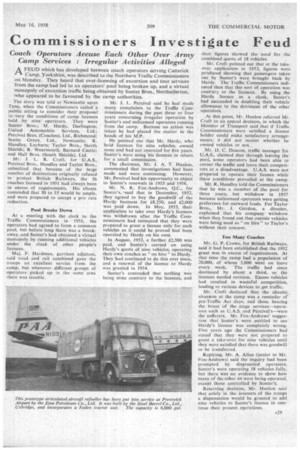Commissioners Investigate Feud
Page 31

If you've noticed an error in this article please click here to report it so we can fix it.
Coach Operators Accuse Each Other Over Army Camp Services : Irregular Activities Alleged
A FEUD which has developed between coach operators serving Catterick r-1 Camp, Yorkshire, was described to the Northern Traffic Commissioners on Monday. They heard that over-licensing of excursion and tour services from the camp had led to an operators' pool being broken up, and a virtual monopoly of excursion traffic being obtained by Sunter Bros., Northallerton, who appeared to be favoured by the camp authorities.
The story was told at Newcastle upon 'Tyne, when the Commissioners called a public sitting to consider their proposal to vary the conditions of camp licences held by nine operators. They were Sunter Bros.; M. Hardy, Darlington; United Automobile Services, Ltd.; Percival Bros. (Coaches), Ltd., Richmond: Scotts Greys, Ltd., Newcastle; R. Handley, Leyburn; Taylor Bros., North Shields; R. Wearrnouth, Barnard Castle; and Hall Bros. (South Shields), Ltd.
Mr. J. L. R. Croft, for U.A.S., Percival Bros., Handley and Taylor Bros., submitted that because of the large number of destinations originally refused to protect British Railways, the 56 coaches licensed in 1951 had always been in excess of requirements. His clients contended that 30 to 35 would be ample, and were prepared to accept a pro rata reduction.
Pool Breaks Down
At a meeting with the clerk to the Traffic Commissioners in 1951, the operators had agreed to form a common pool, but before long there was a breakaway, and Sunter's had obtained a virtual monopoly by running additional vehicles under the cloak of other people's licences.
Maj. F. Hardman, garrison adjutant, said road and rail combined gave the troops an excellent service from the camp, but whenever different groups of operators picked up in the same area there was trouble. Mr. J. L. Percival said he had made many complaints to the Traffic Commissioners during the past three or four years concerning irregular operation by Sunter's and unlicensed operators running from the camp. Because no action was taken he had placed the matter in the hands of his M.P.
He pointed out that Mr. Hardy, who held licences for nine vehicles, owned none and had not operated for five years. Sunter's were using his licences in return for a small commission.
The chairman, Mr. J. A. T. Hanlon, commented that investigations had been made and were continuing. However, Mr. Percival had his opportunity to object to Sunter's renewals in 1953 and 1956.
Mr. N. R. Fox-Andrews, Q.C., for Sunter's, said that in December, 1952, they agreed to buy the goodwill of the Hardy business for £8,250, and £2,000 was paid down. In May, 1953, their application to take over Hardy's licences was withdrawn after the Traffic Commissioners had intimated that they were prepared to grant a licence only for such vehicles as it could be proved had been operated by Hardy on his own.
In August, 1953, a further £2,500 was paid, and Sunter's carried on using Hardy's quota of nine vehicles, operating their own coaches as "on hire" to Hardy, They had continued to do this ever since, and a renewal of the licence to Hardy was granted in 1954.
Sunter's contended that nothing was being done contrary to the licences, and their figures showed the need for the combined quota of 18 vehicles.
Mr. Croft pointed out that at the takeover application in 1953, figures were produced showing that passengers taken out by Sunter's were brought back by Hardy. The Traffic Commissioners indicated then that this sort of operation wascontrary to the licences. By using the Hardy licence as a cloak, Sunter's had succeeded in doubling their vehicle allowance to the detriment of the other operators.
At this point, Mr. Hanlon referred Mr. Croft to an appeal decision, in which the Minister of Transport said that if Traffic Commissioners were satisfied a licence holder could make satisfactory arrangements, it did not matter whether he owned vehicles or not..
Mr. D. C. Deacon, traffic manager for U.A.S., claimed that through leaving the pool, some operators had been able to corner the traffic and leave their competitors at a disadvantage. U.A.S. were not prepared to operate their licence while these conditions prevailed at the camp.
Mr. R. Handley told the Commissioners that he was a member of the pool for three years, but withdrew in 1957 because unlicensed operators were getting preference for outward loads. For Taylor Bros., Mr. J. Gordon, a director, explained that his company withdrew when they found out that outside vehicles were being used as "on hire" to Taylor's without their consent.
Too Many Coaches Mr. Ci. P. Crowe, for British Railways, said it had been established that the 1952 grant was in excess of requirements. At that time the camp had a population of 20,000, of whom 5,000 went on leave every week. The traffic had since decreased by about a third, so the licences needed revision. Excess vehicles had resulted in wasteful competition, leading to various devices to get traffic.
Mr. Croft declared that the chaotic situation at the camp was a reminder of pre-Traffic Act days, and those bearing the brunt of the stage services—operators such as U.A.S. and Percival's—were the sufferers. Mr. Fox-Andrews' suggestion that Sunter's were entitled to use Hardy's licence was completely wrong. Five years ago the Commissioners had stated that they were not prepared to grant a take-over for nine vehicles until they were satisfied that there was goodwill to be transferred.
Replying, Mr. A. Allan (junior to Mr. Fox-Andrews) said the inquiry had been prompted by disgruntled operators. Sunter's were operating 18 vehicles fully, but there was no evidence to show how many of the other 44 were being operated, except those controlled by Sunter's.
Reserving decision, Mr. Hanlon said that solely in the interests of the troops a dispensation would be granted to add nine vehicles to Sunter's licence to continue their present operations.




































































































